The relationship between marijuana and high blood pressure is so complex that even the experts cannot agree on whether cannabis is safe for people with hypertension.
Some say that cannabis use increases the risk of cardiac arrest in people who already suffer from high blood pressure, while others state that more studies are needed to prove such claims.
And, according to seasoned weed vets and observational studies, cannabis initially causes a slight rise in blood pressure and then lowers it.
Most of the studies I found while writing this article also have opposing conclusions.
To find out the truth behind many claims regarding this topic, I decided to go through every important study dealing with the effects of weed on blood pressure and then present my findings in this guide.
Also, I’ll be looking into experiences of real users, which I believe are of the utmost importance in cases like this one.
What is high blood pressure (hypertension)?
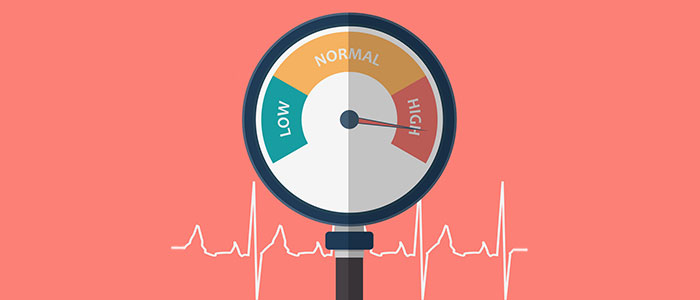
Before we can dive into the effects of marijuana on blood pressure we first need to understand the difference between normal and high blood pressure.
As your heart beats, it pumps blood through your arteries. Blood pressure is determined by measuring the force of the blood pressing against the artery walls. The force of blood in the arteries when your heart pumps is measured as systolic pressure. The force measured at the moment of rest between heartbeats is diastolic pressure.
For most healthy adults, normal blood pressure is less than 120 millimeters systolic and less than 80 millimeters diastolic.
High blood pressure means the heart has to work harder to pump blood which causes strain and weakening. It also causes the walls of the arteries to get damaged over time.
High blood pressure is a cardiovascular condition which occurs when the blood pressure in arteries is constantly elevated.
Hypertension affects about a third of adult Americans and around 17.7% of Canadians. The condition usually does not cause any symptoms and it is often only discovered during a medical checkup. Hypertension is not something that should be ignored. It can cause serious health problems if left untreated.
As with many other conditions, there are certain risk factors that can influence the development of the disease; genetics, smoking tobacco, drinking alcohol, obesity, poor diet and stress all play a role.
What does science have to say about cannabis and hypertension?
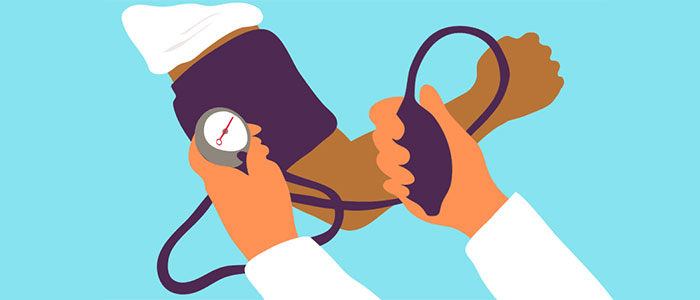
There are currently only a few studies on the influence of cannabis on blood pressure and the studies can be contradictory.
But here is what I found.
THC and hypertension
A study published in August 2017, titled “Effect of marijuana use on cardiovascular and cerebrovascular mortality” (1) is one of the most quoted studies on marijuana and high blood pressure.
This paper concluded that regular cannabis users are more likely to die from hypertension and that the length of time that marijuana was used increases the risk.
But there is one huge problem with it:
It’s made of participants who used cannabis “at least once in their life”, so we basically have no idea whether the subjects continued to smoke every day or they just smoked once in high school. This leaves a lot of room for misinterpretation.
There are a few studies that suggest that occasional users may experience a mild or moderate increase in heart rate, with a slight increase in blood pressure 10-15 minutes after consuming cannabis. (2)
These studies claim that, after the initial increase, our blood pressure drops, leaving us sleepy and groggy (sounds familiar, right?).
Some cannabis consumers can also develop tolerance to uncomfortable side effects of pot just a few days or weeks after using it.
When it comes to more severe consequences of high blood pressure related to cannabis use, we can only rely on CARDIA’s report, which investigated more than 3,500 Americans over the course of 15 years. (3)
The results might sound surprising at first:
No long-term connection was found between marijuana and cardiovascular diseases, such as heart attack and stroke.
However, the study also pointed out this:
“Although marijuana use was not independently associated with cardiovascular risk factors, it was associated with other unhealthy behaviors, such as high caloric diet, tobacco smoking, and other illicit drug use.”
Another study done by Harvard Medical School suggested that:
The risk of having a heart attack is increased five times during the first hour after smoking cannabis but then drops 1.7 times during the next hour. The risk returns to normal after two hours.
At this point, it’s important to note that many other everyday activities bring with them a much higher risk of heart attack, such as sex.
There have been a few reported cases of people having a heart attack after smoking weed. As you may assume, it’s impossible to conclude if weed and its influence on blood pressure was the main culprit in these cases.
Can CBD lower blood pressure?
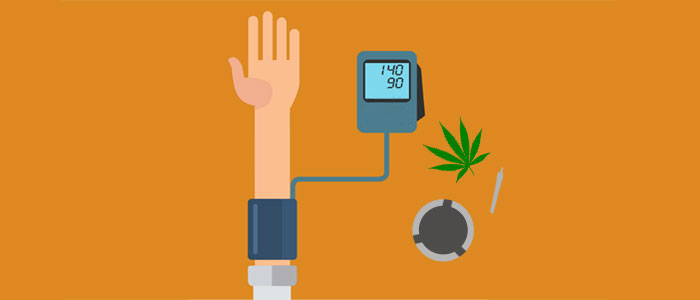
The problem with the studies I found is that most of them are focused only on one cannabinoid in the cannabis plant — the psychoactive, tetrahydrocannabinol (THC).
Other than THC, cannabis contains more than 100 other cannabinoids and over 200 different terpenes.
Today, we have hundreds of different strains on the market, each with a different ratio of THC to CBD and each with different medical effects.
THC has been shown to make some people anxious, sometimes even paranoid (but these are usually just short-term effects, which go away as soon as the high wears off).
Elevated heart rate always goes hand in hand with anxiety, therefore it’s almost expected for some users to get an increase in blood pressure.
Exclusive bonus: Download a free dosage guide that will show you the exact step-by-step process Dr. Dustin Sulak used to successfully treat more than 18,000 patients with cannabis.
On the other hand, the second most abundant cannabinoid, the one that’s been stealing the spotlight lately, seems to have a completely opposite effect on blood pressure than THC.
I’m talking, of course, about cannabidiol, or better known as CBD — famous for reducing all types of anxiety and inflammation.
According to a small study published in JCI Insight, a single dose of CBD lowers systolic blood pressure. (4) Researchers found that CBD relaxes smooth muscle cells in the arteries, widens the blood vessels, thus providing a smoother blood flow and a lower blood pressure.
Strains for people who suffer from high blood pressure
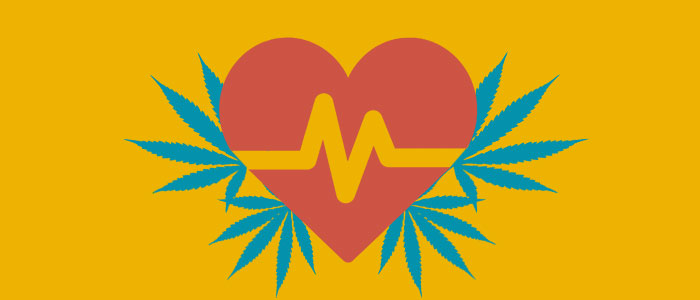
Smoking is one of the main causes of high blood pressure.
If you are suffering from hypertension you should avoid smoking altogether, as it will most likely cause your blood pressure to increase further.
Smoking is not the only cannabis consumption method. Vaping and edibles (including oils) can be healthier alternatives to burning up a flower.
While I was doing research for this article, I glanced over some comments and threads on Reddit, and I found differing user opinions on the cannabis-hypertension relationship.
Some patients who used marijuana frequently got their blood pressure back into the normal range only after quitting weed completely.
Some patients smoke regularly and they claim weed helps keep their BP in check.
So, if you like weed and have been diagnosed with hypertension, my advice would be to:
● Consult your doctor
● Avoid smoking and instead, use one of the healthier ways of consuming weed
● Try exploring cannabis strains that are high in CBD
● Take smaller doses and don’t overdo it (baby steps are the best)
Start with the 5 strains I’ve listed below, little by little, and monitor your blood pressure after using pot.
If your blood pressure rises after using weed, quit smoking altogether.
You can live without smoking cannabis and your health and well-being should be your number-one priority at all times.
Purple Wreck
One of the most popular strains in the medical world, this thoroughbred indica is recommended for a variety of conditions.
Purple Wreck will give you full body relaxation while eliminating stress at the same time. This strain won’t make you sleepy as most indicas but it’s best used at night, as you close off your day.
Blue Dream
Also a very popular medical strain, Blue Dream provides calming relaxation and tension relief.
Northern Lights
Although this strain has a very high THC content, hypertension patients have reported good experiences with it. Northern Lights will help all your muscles relax.
Super Sour Diesel
Super Sour Diesel is a very potent strain, so take it easy with this one, as you would with any other strain rich in THC. Provided you get the dosage right, it will help you leave behind any stress, which is also one of the main causes of hypertension.
Green Crack
Formerly known as “Cush”, Green Crack got its new name from Snoop Dogg — after he tried this potent sativa, he joyously renamed it because of the energetic kick it brings.
Because of its sativa dominance, Green Crack is much better suited for daytime use, and with its moderate-to-high THC levels (between 15% and 20%) it is beneficial for a wide array of medical issues including chronic pain, arthritis, and depression. Even though the ominous name may suggest otherwise, do not fret, this is 100% quality cannabis flower.
References:
- Yankey BA, Rothenberg R, Strasser S, Ramsey-White K, Okosun IS; Effect of marijuana use on cardiovascular and cerebrovascular mortality: A study using the National Health and Nutrition Examination Survey linked mortality file; European Journal of Preventive Cardiology; November 2017; 24(17):1833-1840
- Pacher P, Bátkai S, Kunos G; Cardiovascular pharmacology of cannabinoids; Handbooks on Experimental Pharmacology; 2005; (168):599-625
- Rodondi N, Pletcher MJ, Liu K, Hulley SB, Sidney S; Coronary Artery Risk Development in Young Adults (CARDIA) Study; Marijuana use, diet, body mass index, and cardiovascular risk factors (from the CARDIA study); The American Journal of Cardiology; August 2006; 98(4):478-84
- Jadoon KA, Tan GD, O’Sullivan SE; A single dose of cannabidiol reduces blood pressure in healthy volunteers in a randomized crossover study; JCI Insight; Jun 2017; 2(12)
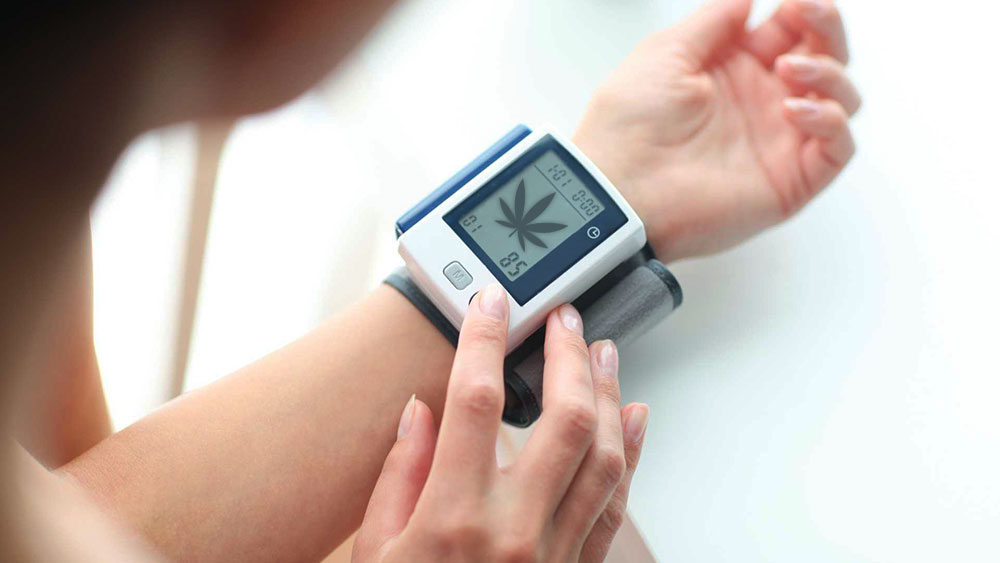

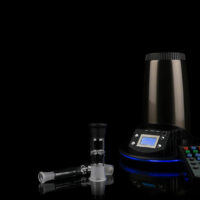
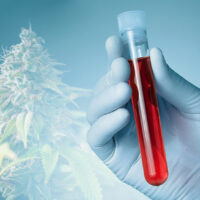




Grass Chief May 30, 2018 at 2:43 pm
It is a very confused and complex matter to come in a point that really marijuana has negative effect on high blood pressure or not. By the way, a very informative post with lots of essential ideas. Great writing.
H Munster September 29, 2018 at 4:09 am
I can only speak for myself. I have drug resistant hypertension and sleep apnea. While I have struggled tip with the cpap for years, when I am able to use it, my bp improves. The cpap in combination with moderate amounts of marijuana reduces my stress and my bp is almost normal. However, if I smoke a lot consistently, my bp becomes elevated. Also, the effects of the marijuana to lower bp do not last during times when I am not high. Vaping is probably even safer. Also, be aware different strains of marijuana may effect you differently. some my relax while others may energize or even cause paranoia.
Jose espinoza November 10, 2018 at 7:02 pm
Very very thank you. For you time to give us .this information is very useful for me since I suffer for blood pressure .and I want to know if regular weed can help you.in that .or I have to smoke the high strength. Since I live in South Texas. I can not found the different kind of weed strength. Only regular .thank you again sincerely José I'm 62